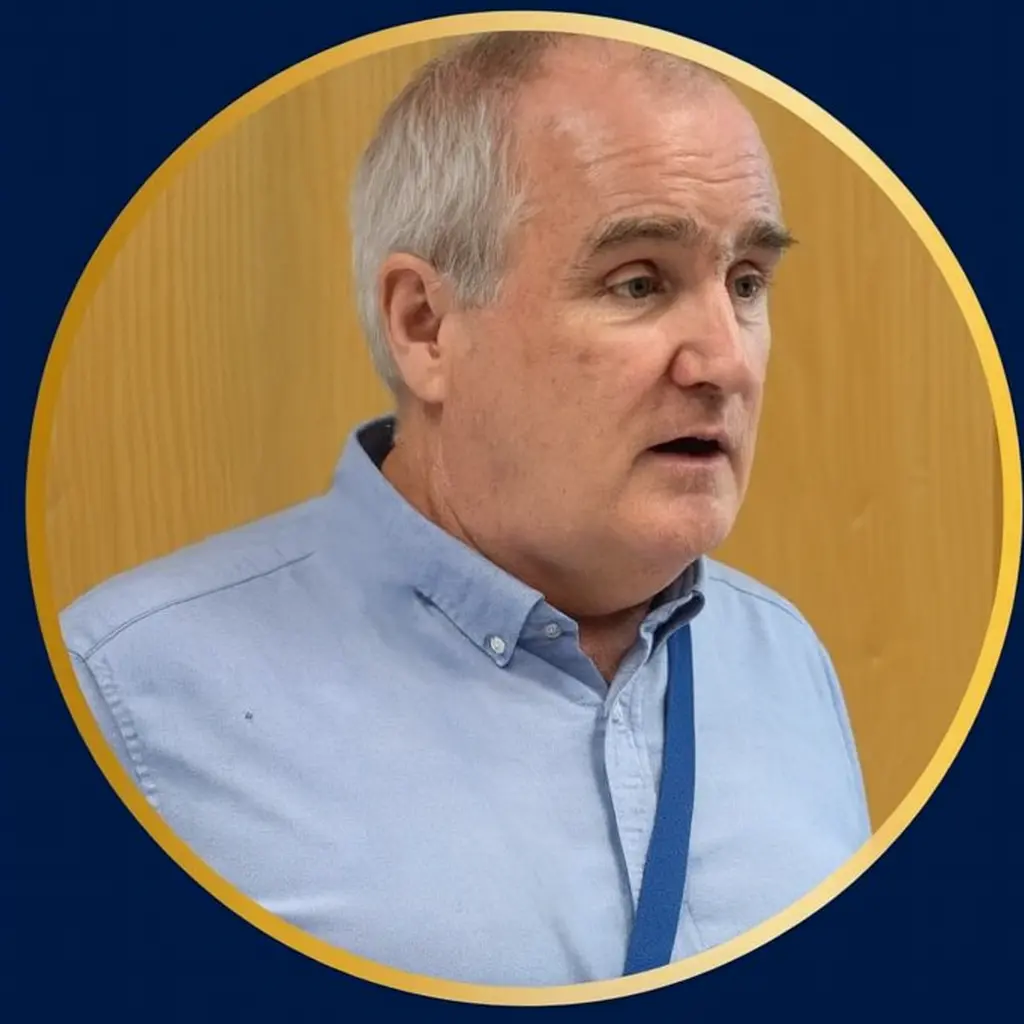
If there’s a figure who embodies both deep experience and relentless commitment in the Irish beekeeping community, it’s Colm O’Neill. Over half a century in the apiary has shaped him into not just a practitioner, but a teacher, advocate, and steward for Apis mellifera mellifera (Amm) – Ireland’s native or “dark” honey bee.
From Early Years to Leadership
Colm’s beekeeping journey began in his youth. Together with his three brothers, he helped his father manage around 30 colonies. These early years were formative – not just in understanding bee biology and husbandry, but in absorbing the rhythms of Irish seasons, climate, and forage cycles.
By his early twenties, he had stepped into leadership, taking over the family beekeeping operation. Over time he and his wife, Imelda, have expanded their enterprise. Today they manage:
- 60 honey-production colonies,
- 30 additional colonies and nuclei, dedicated to the rearing of Amm queens and nuclei for sale.
Notably, Colm and Imelda restrict their stock exclusively to Apis mellifera mellifera. Their rationale revolves around:
- Local adaptation (bees that are “tuned” to Irish climate and flora)
- Ease of management
- Rapid spring build-up
This choice reflects a philosophy: working with the environment, not against it.
What’s inspiring is that this is essentially a side-line for both of them. Each holds a full-time job beyond beekeeping. Their weekends and weekday evenings are given over to bee work, queen rearing, and the maintenance of their stock.
Education, Leadership & Community Building
Colm’s role in the beekeeping community goes far beyond his own hives. His positions and activities include:
- Education Officer for his local beekeeping association
- Committee member of the Native Irish Honey Bee Society (NIHBS)
- Teacher of beekeeping, bee-improvement, and queen-rearing classes – both on his property and at association apiaries during summer months
- Co-trainer (with Jonathan Getty) for the NIHBS Queen Rearing Group Scheme (QRGS) online training since 2021, reaching over 400 members
His aim is clear: to pass on the knowledge amassed over decades to both new and seasoned beekeepers alike.
Through NIHBS, Colm is deeply involved in conserving and promoting the native Irish honey bee, Apis mellifera mellifera. NIHBS was founded in 2012 with the mission to raise awareness of the native bee, discourage importation of non-native bees, and foster conservation and improvement of local bee stocks.
The NIHBS Queen Rearing Group Scheme
One of the keystones of NIHBS’s work—and one to which Colm has contributed heavily – is the Queen Rearing Group Scheme (QRGS). Launched in 2020, the QRGS helps clusters of beekeepers (6–20 per group) to hone queen-rearing skills and establish local breeding of Apis mellifera mellifera queens.
Groups receive:
- Education (via online courses)
- Mentorship and practical support
- Genetic material and equipment to begin queen rearing
- Tools to raise both virgin and mated queens
- The expectation that surplus queens or nucs will be shared, donated, or sold locally
The goal is self-sufficiency. Beekeepers across Ireland can become less dependent on imported queens, reducing genetic drift and hybridisation risk.
Under the training of Colm and others, the program has grown rapidly: from 13 groups in its first year to over 50 groups later, with more than 400 beekeepers participating.
Why Focus on Apis mellifera mellifera?
The decision to use only native Irish honey bees (Amm) is more than sentimental—it’s ecological, strategic, and rooted in conservation. Key reasons include:
- Local adaptation: Amm is considered better suited to Irish weather, forage conditions, and seasonal patterns.
- Rapid spring build-up: A trait particularly valuable in temperate/climate-challenged environments
- Genetic integrity: Avoiding importation helps prevent hybridisation and genetic dilution of native stock
- Ease of management: Anecdotally, many beekeepers report more predictable behavior and manageable temperament when working with well-adapted local bees
It’s worth noting too that recent research has underscored the distinctiveness (and vulnerability) of the Irish Amm population. A recent study analyzing 505 colonies found evidence that introgression from non-native bees is threatening the unique population of Irish dark bees.
NIHBS strongly advocates for legal protection and restrictions on importation of non-native bees to preserve the native stock.
Challenges & Opportunities
Operating a beekeeping enterprise is never straightforward, and Colm’s path has likely faced many of the typical – and atypical – challenges:
- Time constraints: Balancing full-time jobs with intensive beekeeping and queen rearing
- Weather dependency: Irish bees (even native ones) are at the mercy of irregular spring climates, rainy spells, and fluctuating nectar flows
- Disease & pests: Varroa mites, brood diseases, and other threats remain ever present
- Genetic drift & hybridisation: Maintaining the purity of Amm requires vigilance
- Scaling education & capacity: Reaching more beekeepers across Ireland and ensuring consistent quality of training
Yet opportunities are equally strong:
- Empowering local beekeepers through training to breed their own queens
- Strengthening genetic conservation of Irish bees
- Raising public awareness and support for native bee protection
- Fostering networks of mentors, group apiaries, and local breeding hubs
Legacy in the Making
Colm O’Neill may not be a globally known name in beekeeping (yet), but his influence is rippling through Ireland’s beekeeping community. Through decades of hands-on practice, teaching, and organizational engagement, he is helping to anchor Apis mellifera mellifera into Ireland’s ecological and cultural landscape.
For beginners or seasoned beekeepers alike, his story offers something to emulate:
- The power of sticking with a long-term vision
- The value of sharing knowledge and building community
- The role of conservation in everyday practice
- The belief that local adaptation and native genetics matter
If you are a beekeeper in Ireland (or beyond), whether you keep Amm or another strain, you might find inspiration (or direct support) through Colm’s work with NIHBS. And perhaps his commitment will nudge more keepers to think carefully about what bees they raise, how they raise them, and what legacy their apiaries will leave behind.
